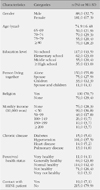Abstract
Purpose
The purposes of this study were to examine the relations among anxiety, knowledge, health locus of control and preventive behavior, and to find factors related with preventive behavior.
Methods
The subjects were 269 elderly people of over 65 living in C City. Data were collected through a structured questionnaire and analyzed by SPSS.
Results
Health promoting behavior was significantly different according to chronic disease, contact with H1N1 patient and perceived health status. The variables that affected the level of preventive behavior were anxiety, knowledge, internal locus of control, external locus of control, chance locus of control and perceived health status.
Figures and Tables
References
1. Guinn B. Health locus of control and HIV/AIDS knowledge among mexican american young adolescents. Health Educ. 1997; 28(6):13–16.

2. Jung HJ. Knowledge, prevention behavior and perceived vulnerability to AIDS of nephrology nurses in hemodialysis centers. Seoul: Ewha Womans University;2005. Unpublished master's thesis.
3. Jung MS. Effect of childbirth education on knowledge, anxiety, labor pain and self-cooperation in primiparas and husbands. J Kyungpook Nurs Sci. 2003; 7(2):99–114.
4. Kim DH. A Study on the factors affection health promoting behavior among the elderly. Seoul: Soongsil University;2010. Unpublished master's thesis.
5. Kim SK. Knowledge, attitude, and prevention health behavior of high school student on the six most common cancers in Korea. Daegu: Keimyung University;2004. Unpublished master's thesis.
6. Korea Center for Disease Control and Prevention. H1N1 crisis communication strategy development. Seoul: Ministry of Health and Welfare;2006a.
7. Korea Center for Disease Control and Prevention. H1N1 preparedness and response plan. Seoul: Ministry of Health and Welfare;2006b.
8. Korea Center for Disease Control and Prevention. Epidemiologic characteristics of deaths associated with 2009 pandemic influenza A(H1N1) virus infection in Korea. Seoul: Ministry of Health and Welfare;2009.
9. Korea Center for Disease Control and Prevention. The main changes of revised ⌜Influenza A(H1N1) 2009 control and prevention guideline⌟ in Korea. 2010. Retrieved February 22, 2010. from http://www.cdc.go.kr/kcdchome/jsp/home/information/had/INFOHAD0001Detail.jsp?menuid=100053&app.
10. Lee DW. Knowledge and practice about infection prevention of early children's mothers. Jinju: Kyungsang University;2008. Unpublished master's thesis.
11. Lee EH, Im SB, Kim IJ, Lee EO. Health locus of control: A review of the nursing research in Korea. J Nurs Acad Soc. 1993; 23(4):694–712.

12. Lee EK. The study of personality, locus of control, coping style influencing older adults' death anxiety. Seoul: Seongshin Womans University;2002. Unpublished master's thesis.
13. Lee HR, Park JS. The Effect of Phase 1 Cardiac Rehabilitation Nursing Care on Knowledge, Anxiety and Self-Care Behavior in Patients with Acute Myocardial Infarction. J Korean Acad Adult Nurs. 1998; 10(2):353–368.
14. Lee S. Modelling for the impact of next influenza pandemic and its application to the 1918's pandemic in korea. Cheongju: Chungbuk National University;2009. Unpublished doctoral dissertation.
15. Lim HJ. A study on awareness of the influenza A(H1N1) and performance of infection control among some dental hygienists. Seoul: Dankook university;2010. Unpublished master's thesis.
16. Park BJ. A study on the relationship between health locus of control and anxiety of primigravidas. Seoul: Yonsei University;1985. Unpublished master's thesis.
17. Park YS. A perceived level of preparedness amongst healthcare workers for pandemic influenza. Seoul: Yonsei University;2008. Unpublished master's thesis.
18. Phares EJ. Locus of control in personality. New Jersey: General Learning Press;1976.
19. Suh HK. A study on the distribution and the types of malocclusion of orthodontic patients. Keimyung Med J. 1988; 7(2):322–329.
20. Son HM, Suh MJ. The effect of preparatory information with slide tape in knowledge and anxiety. J Korean Acad Adult Nurs. 1990; 2:30–42.
21. Shim YS. A study of the relationship between health locus of control and self-care behavior of diabetes mellitus patients. Seoul: Yonsei University;1984. Unpublished master's thesis.
22. Wallston KA, Wallston BS, DeVellis R. Development of the multidimensional health locus of control (MHLC) scale. Health Educ Monogr. 1978; 6:160–170.




 PDF
PDF ePub
ePub Citation
Citation Print
Print







 XML Download
XML Download